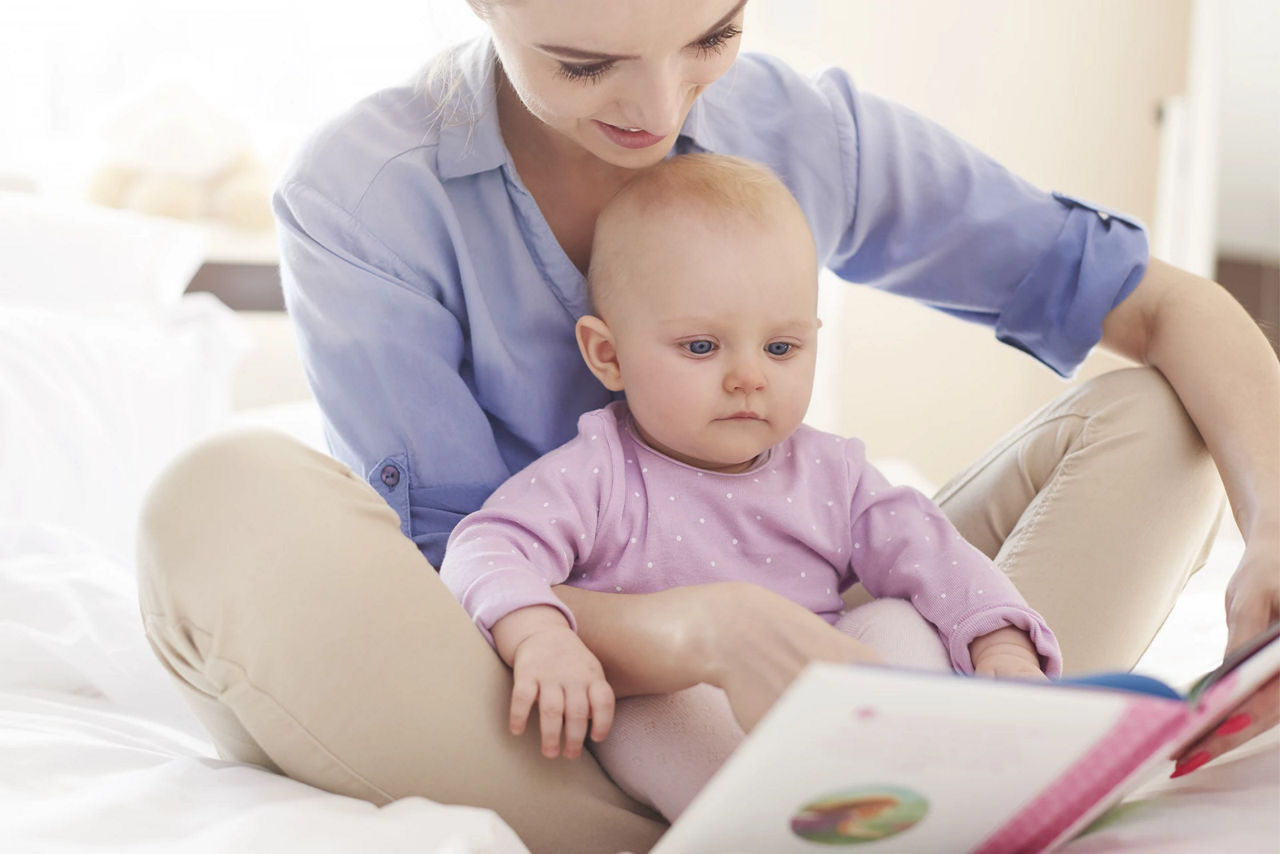It’s a difficult task understanding your child’s emotional needs. Find out what it means to practice responsive parenting, and how it can influence your child’s future emotional and cognitive development, from child health education expert, Dr Aric Sigman.
Supporting your toddler’s development through responsive parenting

First response
Guiding your toddler with love and positivity
As a parent, it’s easy to identify our children’s physical needs – nutritious food, shelter, access to effective health services. But a child’s emotional needs, particularly in a young child or toddler, might not be as obvious as they are still learning how to communicate.
One of the most vital experiences in shaping a child’s developing brain is what’s known as ‘serve and return’ interaction between children and parents. Infants and toddlers naturally reach out for interaction through babbling, facial expressions, and gestures and adults respond with the same kind of gesturing back.1 This back-and-forth process is fundamental to the wiring of the brain, especially in the earliest years.
Responsive parenting encourages ‘serve and return’ interaction through the expression of warm and accepting behaviours to respond to children’s emotional signals.

This aspect of parenting helps us understand and better respond to our children’s needs and can have a significant influence on a young child’s health and development.2,3
What does responsive parenting involve?
Understanding our children’s needs can be a complicated process; one that often sees us closely observing and making sense of the signals our children are giving us through their behaviour. Responsive parenting involves us being more conscious and aware of our children to be able to learn what makes them tick – what makes them excited, engaged, angry or calm. It can take different forms depending on the situation, for example if we are responding to cues such as a sign of illness, a verbal comment, or a particular facial expression.2 It can also depend on who is responding, which in the early years is often the mother. In each case, if we are responding to a situation with our children, it tends to follow a three stage process: 2
- Observation: Observing our children’s body language and cues, such as their actions and dialogue
- Interpretation: Interpreting these signals, for example are they tired, or are they showing signs of feeling unwell?
- Action: Acting quickly, consistently and efficiently to meet our children’s needs
Why is responsive parenting important?
Responsive parenting is immensely powerful, improving child health and development both in the short and long term, even at a genetic level. The genes our children inherit are not static or set in stone but are ‘expressed’ - activated or deactivated - by our children’s experiences. This in turn shapes their developing brain architecture and strongly affects whether they grow up to be healthy, productive members of society.
Positive experiences leave a chemical “signature” on the genes that activate a child’s genetic potential.4,5
School-age children whose mothers provided positive experiences early in life have brains with a larger hippocampus, a key structure important to learning, memory and response to stress.6
 Responsive parenting helps understand and better respond to our children’s needs and can have a significant influence on their health and development.
Responsive parenting helps understand and better respond to our children’s needs and can have a significant influence on their health and development.
Studies have also shown that maternal responsiveness has a protective effect on the development of low-birth-weight infants, decreasing problems such as social anxiety and depressive mood.7,8
Whilst responsive relationships are important to a child’s health and development, an absence of such parenting may have a negative impact, particularly in toddlers. Clearly there may be circumstances and situations in which we are unable to immediately respond to the everyday (sometimes demanding) needs of our toddlers and so parents shouldn’t overly worry about not being at their toddler’s constant beck and call.
But from infancy a significant breakdown in the ‘serve and respond’ interaction, unreliable or lack of responses may disrupt development of the child’s brain. The lost opportunities associated with a lack of interaction with our children may lead to stress in a toddler, that may lead to problems in learning, behaviour and health.1,9
Being consistently responsive and understanding our children’s ever changing development needs is a complex and demanding process, that some of us may find harder to achieve than others.10 This may be particularly true in specific circumstances such as for parents of children with special needs. It is often the case that parents from underprivileged backgrounds assume they have less impact on their children’s outcomes, but even small efforts to respond to our children can have a positive outcome.
How can we maintain and improve our responsive interaction with our children?
Parenting is hard. Responsive parenting can be highly demanding and in some cases there is some coaching to be done. In fact, interventions helping parents recognise the importance of responsive behaviours have shown that increases in responsiveness result in children developing more secure bonding and attachment to their parents along with better problem-solving, language, and social skills.11
An excellent example of this interaction is shared book reading. We may already undertake the routine of reading a book to our children before bed, but shared book reading can lead to other benefits.
Shared book reading involved exploring a book together with our children and is important for promoting oral language and improving literacy.11
Studies have examined the impact of teaching parents to use techniques that encourage young children to talk about illustrations and the book as a whole. These techniques and interactions had positive effects on children’s language, particularly for children at low risk for literacy problems.11,12

Next steps
- At times book reading will be a ‘bidirectional process’ where a conversation with our children will naturally unfold beyond the actual text. We can take advantage of this by simply allowing that conversation to take place and responding to our children’s remarks, reactions, questions and perhaps expanding on some of them
- When reading to our toddlers, without being a pushy school teacher, we can encourage them to identify pictures or words as we read, or have them read words with us.
- Not too many questions. While stopping occasionally to ask questions about the story it's important not to interrupt the flow in order to allow our children to develop sustained attention.
- Our children pick up on our reactions to what is being read. So, if we can immerse ourselves in the story, enjoy the book and the uninterrupted time with our children they are more likely to enjoy the story and reading in general. Reading shouldn't be merely a form of home education. Our enthusiasm for the book counts.
- Sometimes our children may simply want to hear our voice reading them a story because they are genuinely interested in the story, but they also find us and our voice comforting and reassuring. In this case there’s no need to push them for ongoing interaction.
Conclusion:
The relationships we establish with our children provide the basis for their social and emotional development. Early parent-child relationships also set the stage for our children’s emotional well-being and social relationships in later stages of life. Having such an early impact on the future development of our children underscores why a lack of responsiveness can be unfavourable in the earliest years of life. Recognising the importance of responsive parenting and where needed, offering effective interventions, are likely to result in better long-term outcomes in emotional well-being, learning, health, and parenting of the next generation.1

Need some help?
You can get quick answers to common questions in our FAQs.
Alternatively, if you need help with general pregnancy or baby advice, or maybe on using or ordering our products - our expert team are always on hand to talk about feeding your baby.
1. Shonkoff JP et al. The science of neglect: The persistent absence of responsive care disrupts the developing brain. Available at http://developingchild.harvard.edu/wp-content/uploads/2012/05/The-Science-of-Neglect-The-Persistent-Absence-of-Responsive-Care-Disrupts-the-Developing-Brain.pdf (Accessed March 2016).
2. Eshel N et al. Responsive parenting: Interventions and outcomes. Bull World Health Organ. 2006;84:991–8.
3. Shah R et al. Positive Parenting Practices, Health Disparities, and Developmental Progress. Pediatrics 2015;136(2):318–326.
4. National Scientific Council on the Developing Child. Early Experiences Can Alter Gene Expression and Affect Long-Term Development: Working Paper No. 10. 2010. Available at www.developingchild.harvard.edu/resources/early-experiences-can-alter-gene-expression-and-affect-long-term-development (Accessed April 2016).
5. Naumova OY et al. Epigenetic Patterns Modulate the Connection Between Developmental Dynamics of Parenting and Offspring Psychosocial Adjustment. Child Dev 2016;87(1):98–110.
6. Luby JL et al. Maternal support in early childhood predicts larger hippocampal volumes at school age. Proc Natl Acad Sci 2012;109(8):2854–2859.
7. Laucht M et al. Differential development of infants at risk for psychopathology: the moderating role of early maternal responsivity Dev Med Child Neurol 2001;43(5):292–300.
8. Landsem IP et al. Early intervention influences positively quality of life as reported by prematurely born children at age nine and their parents; a randomized clinical trial. Health Qual Life Outcomes 13: 25. Published online 2015 Feb 22.
9. Molet J et al. Fragmentation and high entropy of neonatal experience predict adolescent emotional outcome. Translational Psychiatry 2016;6:e702.
10. Landry SH et al. A responsive parenting intervention: The optimal timing across early childhood for impacting maternal behaviours and child outcomes. Dev Psychol 2008;44:1335–1353.
11. Landry SH et al. The effects of a responsive parenting intervention on parent-child interactions during shared book reading. Dev Psychol 2012;48:969–86.
12. Sloat EA et al. (2015) Parent-mediated reading interventions with children up to four years old: a systematic review. Issues Compr Pediatr Nurs 2015;38(1):39–56.
Last reviewed: 30th June 2016

